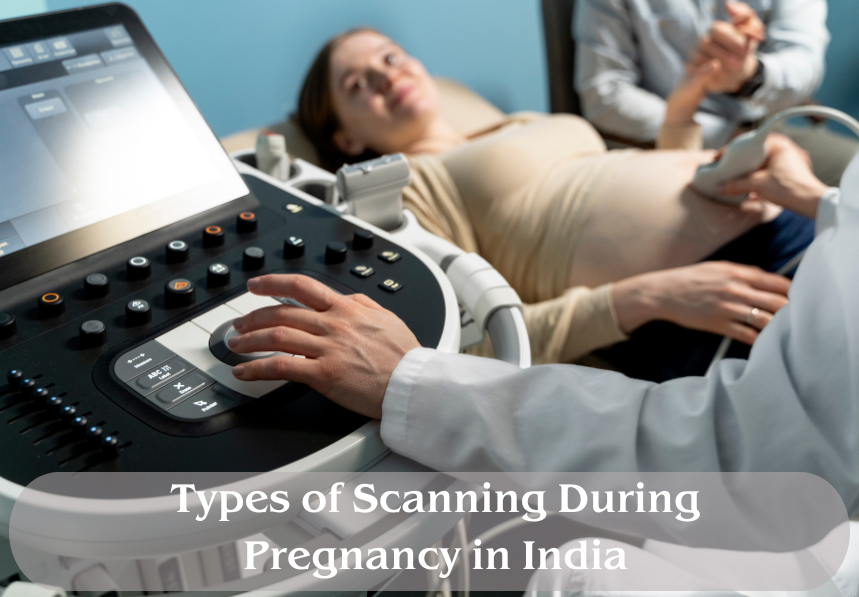Certainly, there are multiple types of ultrasound scans during pregnancy, each conducted at different stages and for various purposes. These scans serve a range of functions, including assessing the likelihood of Down’s syndrome, estimating the risk of preterm labour, and addressing various other concerns related to pregnancy. Experience the future of prenatal care at Diva Women’s Hospital, Ahmedabad. Our state-of-the-art facility offers 3D/4D sonography, bringing your baby’s world to life like never before. Schedule your appointment today for a glimpse into the extraordinary.
Early pregnancy/Dating scan (8 – 11 weeks)
This scan serves a dual purpose: first, it confirms the presence of a pregnancy and provides an estimated due date (EDD). During this scan, the fetal heart rate is typically detected, offering reassurance to expectant parents. Furthermore, knowing the EDD through this scan is crucial before undergoing the non-invasive prenatal test (NIPT), which assesses the risk of Down’s syndrome. The scan is performed externally on the abdomen, but in certain cases, an internal scan may be necessary for enhanced information and clarity.
Nuchal Translucency scan (11-14 weeks)
The Nuchal Translucency scan, which happens between 11 to 14 weeks of pregnancy, is an important test to check the health of your baby. During this scan, a specially trained technician uses ultrasound to measure the thickness of a small space at the back of your baby’s neck. This measurement helps to assess the risk of certain genetic conditions, such as Down syndrome. It’s a safe and painless procedure that doesn’t harm your baby. The results can provide you with valuable information about your baby’s health, allowing you to make informed decisions about your pregnancy. It’s an important step in ensuring the well-being of both you and your baby.
Early anomaly scan (14 – 18 weeks)
The Early Anomaly Scan, which takes place between 14 to 18 weeks of pregnancy, is another important checkup for your growing baby. During this scan, a skilled healthcare provider uses ultrasound to look closely at your baby’s organs, bones, and overall development. They check to make sure everything is developing as it should be. This scan helps identify any potential problems early on, so if there are any concerns, your healthcare team can provide the right care and support. It’s a safe and painless procedure, and it gives you a chance to see your baby’s progress and ensure they are healthy and growing well. This scan is an important part of taking care of both you and your baby during pregnancy.
Foetal anomaly scan (18 – 24 weeks)
The Early Anomaly Scan, typically conducted between 19 to 22 weeks, offers a comprehensive examination of your baby from head to toe, ensuring everything is developing as expected for this stage of pregnancy. It’s the scan where most potential issues are identified if they exist. If any concerns arise, our fetal medicine experts delve deeper for more information. Our skilled consultants are proficient in evaluating the normalcy of the fetal brain and heart, providing you with explanations, implications, and referrals to specialists like fetal cardiologists if needed, along with supportive counseling about your options. Furthermore, this scan assesses the position of the placenta and blood flow through it, which helps shape future pregnancy management plans. Additionally, we can predict the risk of preterm labor by measuring the cervix’s length using an internal scan. This thorough examination ensures the best care and well-being for you and your baby throughout your pregnancy journey.
Growth scan 24 weeks onwards
The Growth Scan, usually performed from 24 weeks onward, is a special ultrasound that checks how your baby is growing inside your belly. It helps make sure that your baby is getting all the nourishment they need and growing at a healthy rate. During this scan, the healthcare provider measures different parts of your baby’s body, like the head, belly, and legs, to see if they’re growing as they should be. This scan also checks the amount of amniotic fluid around the baby and the position of the placenta. It’s an important way to make sure your baby is healthy and growing well as your pregnancy progresses.
3D scans: Available for every scan
During any of the scans mentioned earlier, it’s also possible to have a 3D scan of your baby. However, the quality of these 3D images depends on various factors like the baby’s position, the placenta’s location, the umbilical cord, the amount of amniotic fluid, and the thickness of the mother’s tissues. Additionally, along with the scans, your healthcare provider may recommend blood tests to screen for conditions like Down’s syndrome and other chromosomal abnormalities.
These blood tests include the First Trimester Combined Screening Test, which combines a blood test for biochemical markers with the nuchal translucency scan, and the Quadruple Test, which combines biochemical markers with the anomaly scan conducted between 14 to 20 weeks.
Furthermore, there’s an advanced option known as Fetal DNA testing, specifically the Non-Invasive Prenatal Testing (NIPT) such as the Harmony test. This test is available from 10 weeks onward, but it’s important to have a scan before undergoing this procedure. These tests provide valuable information about your baby’s health and development, giving you a comprehensive picture of your pregnancy’s progress.
If you’re seeking maternal-fetal medicine (MFM) and obstetric care in Ahmedabad, we recommend scheduling a consultation with Dr. Pooja Patel, renowned as one of the leading gynecologists in the area. Her expertise and experience make her a top choice for comprehensive care during pregnancy and childbirth. Contact and arrange a consultation and ensure the best possible care for your maternal and fetal health needs in Ahmedabad.

